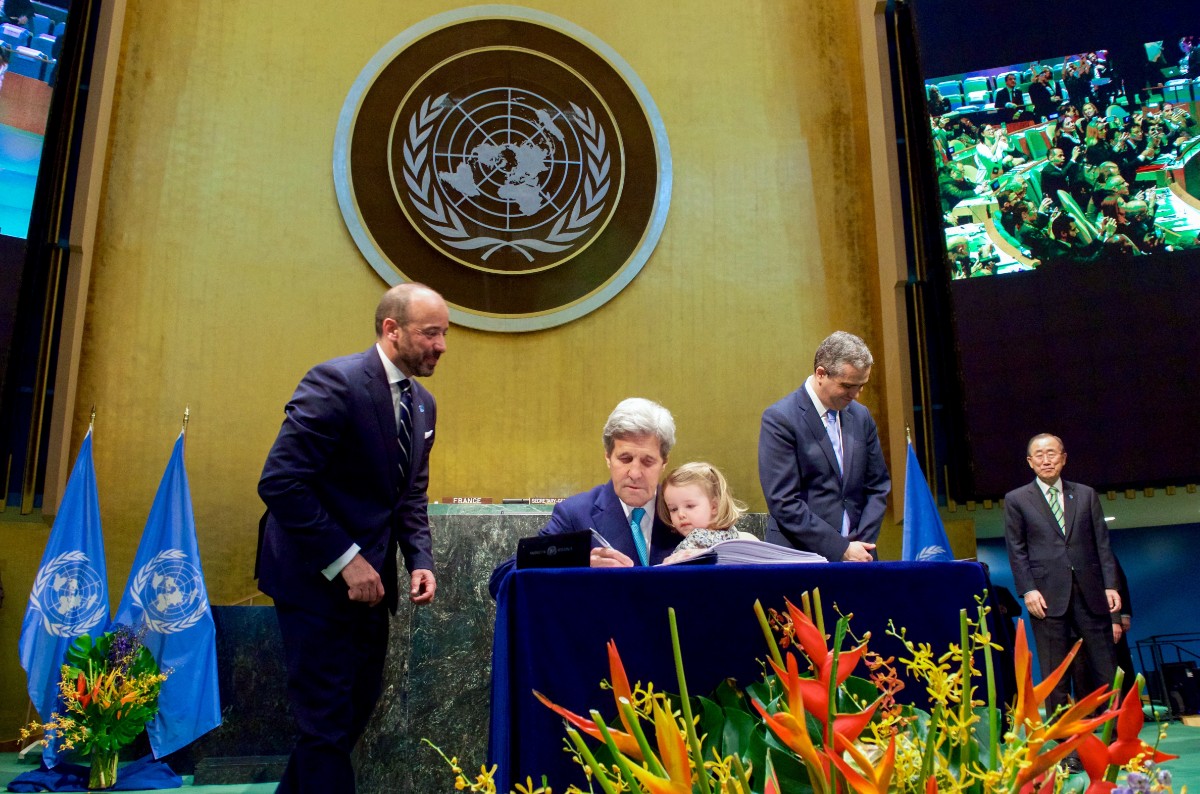 Photo Credit: US State Department
Photo Credit: US State Department
Leaving the Paris Agreement Abdicates US International Leadership – and Harms National Security
With the anniversary of the US leaving the Paris Agreement last month, it’s a good time to reflect on the implications of the decision. While the US cannot formally withdraw from the agreement until November 2020 – a short time after the US presidential election in 2020 – US President Donald Trump announced his intentions to do so on June 1, 2017.
Leaving the Paris Agreement is not just a loss for climate change advocacy groups in the US, but it also is a harms US national security by abdicating US leadership on the global stage.
What is the Paris Agreement?
At the 21st Conference of Parties in Paris in December 2015, the landmark Paris Agreement was adopted. The Agreement, for the first time, brought almost 200 states – including Russia and China – into a common cause to combat and adapt to the effects of climate change.
The primary goal of the Agreement is to keep global temperature rise well below 2 degrees Celsius above pre-industrial levels by pursuing efforts to reach an even more ambitious goal – keeping global temperature rise below 1.5 degrees Celsius.
A difference of half a degree Celsius may not seem like a lot, but the effects on the Earth would be profound. At 2 degrees Celsius, Arctic ice-free summers are 10 times more likely. 37% of the world population will be exposed to extreme heat events every five years, 411 million people in cities will be exposed to severe drought, and 32-80 million people worldwide will be exposed to flooding from sea level rise by 2100.
Why did the US Leave?
The US withdrawal from the Paris Agreement – which remains in effect despite the lack of US support – means that the accord loses the world’s largest economy and second largest emitter of greenhouse gases.
The rationale for the US withdrawal from the Paris Agreement was primarily economic and an attempt to satisfy the president’s base. President Trump stated, “The Paris accord is very unfair at the highest level to the United States.” Trump also said, “The Paris accord will undermine our economy” and the agreement “puts us at a permanent disadvantage.”
Removing the US from the accord also fulfilled a promise the president made on the campaign trail and simultaneously satisfied a strong Republican opposition to the accord.
However, participating in the Paris Agreement would not cause the economic damage the president has claimed. Withdrawal also does not satisfy strong Republican opposition as a survey conducted by Yale University and George Mason University shows that a majority of Democrats and Republicans believe the US should participate in the Paris Agreement.
Implications for National Security
Withdrawing from the Paris Agreement harms US national security interests. It abdicates US leadership on the international stage – leaving a vacuum to be filled – at a time when great power competition is the primary focus of US national security.
The 2018 National Defense Strategy states, “The central challenge to U.S. prosperity and security is the reemergence of long-term, strategic competition by what the National Security Strategy classifies as revisionist powers. It is increasingly clear that China and Russia want to shape a world consistent with their authoritarian model—gaining veto authority over other nations’ economic, diplomatic, and security decisions.”
While the US is removing itself from the world climate change discussion, Russia and China are taking center stage. Instead of backing out of the Paris Agreement alongside the US, (which would have fit the historical pattern of Washington-Bejing climate agreements) China has doubled down. China’s Special Representative on Climate Change stated, “[The Paris Agreement is] very effective and efficient” and held a summit in 2017 with the European Union and Canada in Brussels to solidify China’s intent to stay in the accord.
Russia is also not following the US lead. Instead, Russia has passed legislation on reducing gas flaring, continues to implement its 2009 Climate Doctrine, and is aiming to ratify the Paris Agreement by the end of 2019.
The US decision to back out of the agreement drew criticism from key US allies including France, Germany, and Italy. Other Western leaders also criticized the move, including the Prime Minister of Belgium, the EU commissioner for climate, and the Secretary-General of the United Nations.
While the US can’t officially leave the agreement just yet, if we want to effectively compete with “revisionist powers” like Russia and China, thumbing your nose at internationally accepted agreements – like the Paris Agreement – is doing exactly the opposite. It’s abdicating Washington’s leadership on the world stage and allowing Russia and China to fill the void. Instead, the US should work with China and Russia on important global issues such as climate change.





